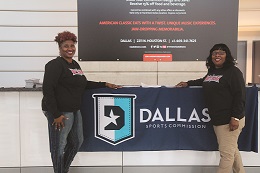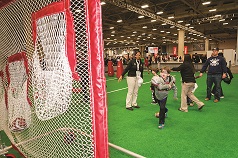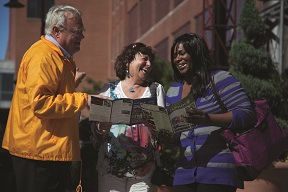

One example is the Fort Worth, Texas, Convention & Visitors Bureau. Even though the city already enjoys a robust sports event landscape, they announced a sports marketing division within the bureau in March of this year – Fort Worth Sports Marketing – for the sole purpose of retaining and attracting sports events.
The Durham Convention & Visitors Bureau, the Durham Chamber of Commerce, Duke and North Carolina Central University have received all the necessary approvals and signatures and are in the process of setting up a sports commission. They fully expect to be up and running within months as well. These two cities and many, many more like them realize how it is possible to strike gold with a flurry of economic activity when you bring athletes, families and visitors to your city for a sports event and they want to capitalize on it even more.
But as different as the cities we have mentioned – and many more like them – happen to be, one thing draws them together. When they put on events, they all get by with a little help from their friends; in this case, defined as a volunteer workforce. Without that body of workers, many sports events across the country would not be able to happen.
So, once you have all the stars aligned (a great event, a great city and a wonderful venue as well as an outstanding partner onsite, such as a sports commission or CVB), how do you begin to go about enlisting, engaging and retaining volunteers? How do you get the right people doing the right activities in the right places?
In some cases, the answers lie in the experience. Even though Durham is just setting up a sports commission, they’re been hosting sports events for years. In 2008 the Durham Convention & Visitors Bureau started a volunteer program called the Durham WayFinders that is a “well-oiled machine, now,” according to Shelly Green, President & CEO. “We’ve done very little marketing and still they keep pouring in,” notes Green. “Our city is full of serial volunteers who enjoy giving back to their community.”
The Dallas Sports Commission was formed in 2014 also after an already longstanding record of hosting major and mega events. The commission played an instrumental part in recruiting more than 640 volunteers that provided over 3,600 hours of service as part of WrestleMania 32 and the activities that went along with WrestleMania Week held in Dallas from March 31 to April 4. They are now in the throes of gearing up for their largest volunteer recruitment campaign ever, to help with the 2017 NCAA Women’s Final Four. This will be Dallas’ first time hosting the Women’s Final Four, although the city hosted a very successful NCAA Women’s Regional Tournament earlier this year.
Harry Woodson is a former athlete and a fan of all sports who has been volunteering for seven years in Dallas. He’s volunteered for some big deal events like the Men’s NCAA Final Four Basketball Tournament, WrestleMania, the Lone Star Volleyball Classic and his favorite was the Women’s NCAA Regional Basketball Tournament.
“I volunteer to be a part of the events and to meet the people participating in the events – the teams, the bands and the coaches,” Woodson says. He loves being around the action and watching the athletes compete and give it their all to accomplish a goal.
 Building Strategic Alliances
Building Strategic Alliances
In Durham, reaching out to event owners, local hosts and organizing committees is, “something we typically do proactively,” added Green. The organization fills 25,000 to 35,000 volunteer hours per year with more than 3,000 Durham WayFinders. Volunteers can go to their website and use a software system that contacts them via text or e-mail when opportunities are available. The volunteers then lets the CVB know which positions they like the best by accepting assignments. Green said, “There are times when it gets very competitive.”
It will take a Dallas volunteer workforce of more than 1,500 people to ensure the success of the NCAA Women’s Final Four tournament.
“Ultimately, you’re asking people to give up their time,” says Jake Lease, Dallas Sports Commission Event Manager. “Sometimes it’s their free time, which no one has enough of, and often they are putting their jobs on hold to be a part of the team.”
Volunteer commitment levels will vary from event to event within the tournament time period. The Dallas Sports Commission made a point to separate itself from the pack and in a short time has become known for not having set minimum shift requirements.
“While this goes a little bit against the industry norm,” according to Lease, the sports commission staff has found that the additional freedom results in volunteers signing up for multiple shifts. This also lends itself to understanding what today’s volunteers want. With a reputation for setting expectations, treating people fairly and making sure that they feel appreciated, the sports commission has noted it becomes much easier for other organizations to align with their recruitment goals.
Best Practices – The 4 Cs
The Dallas Sports Commission has determined what it takes for their volunteer program to be most effective, and it’s based on these four principals: Consideration, Communication, Clarity, and Comfort:
According to the sports commission staff, it is essential to take into Consideration and know that a volunteer’s time is his or her most valuable commodity. Communicating effectively while not saturating them with unnecessary information is what makes for an easier recruitment and retention process. Clarity when it comes to expectations and necessary next steps ensures that their on-site process is as smooth as possible. The Comfort part involves making sure their shifts are the appropriate length with built-in breaks, the necessary resources are provided (be it meals, refreshments, apparel, etc.) and they are shown appreciation for what they are doing.
Something that has worked really well for the Rutherford County Convention & Visitors Bureau in Murfreesboro, Tennessee, is their 20-year history of matching volunteer business leaders with incoming teams for the Tennessee Secondary School Athletic Association High School Basketball Championship each year in March.
There isn’t a designated sports commission for the area, but Wendy Bryant, director of communications, says, “It takes a village, and we’re lucky to have volunteers who return year after year.”
The volunteer business leaders act as a single guide to anything and everything that moves in the county. This strategically maximizes volunteer opportunities for retired business leaders. Bryant noted.
Worst-Case Scenario
Whether the event is small-, medium- or large-scale, single or multiple days, there is always the possibility of attrition on game day. It’s a worst nightmare come true or just waiting to happen if you haven’t already experienced it. What do you do when you have a higher than anticipated number of volunteers who don’t show up at all and you’re left with less than what you need to make your event a success? It’s something nobody likes to think about, but the Dallas Sports Commission has been there.
“That’s when you have to really just buckle down and start working the phones,” says Lease. “We called some of our most reliable volunteers and asked for assistance, and in the end, we were able to start the event on time, fully staffed and with no delays.”
There are no horror stories to date as far as Wayfinders go in Durham. Occasionally, people do ’no-show’ for their shifts, but Green said, “As we train volunteer coordinators, we frequently advise them to schedule a few more people than they need.”

If you’re coming into a new city, the idea of finding volunteers might be one of those things that causes a minute of panic. Rest assured, though, there are ways to find the help you need. All it takes is a bit of research.
Local Sports Commission or CVB: It almost seems like a no-brainer and indeed, your onsite partner should be your first line of information. Many organizations keep a volunteer database on hand, and are adept at blasting out e-mails or texts, putting notices on their websites and so forth, so that interested volunteers are able to find out about upcoming opportunities. Clarify in advance who is responsible for scheduling those volunteers to work.
State or Community Sports Associations: If, for example, you’re putting on a tennis tournament, reach out to the community tennis association. Volunteers who are interested in a sport will have a great time being involved. Local tennis clubs might also be a good jumping-off point. This is also a good way to find any help you need in an official or refereeing capacity.
Colleges: Some colleges have clubs or organizations (these may or may not be related to sports) that are interested in helping out with community events. Fraternities, sororities and others may also promote community service among their members.
Churches, Civic Groups and More: Volunteers come from all walks of life; make sure you investigate a variety of options.
As a side note, don’t wait until a few weeks before the event to ask for volunteer help. Put the feelers out as early as possible so that you have time to get the help you need.
What’s The Best Way to Keep Volunteers Interested?
Event owners have created a series of best practices that contribute to volunteer retention:
Training and Informational Sessions: Volunteers like to know what they’re getting into. Giving them a quick run-through of the task(s) they’ll be doing will make them more comfortable with the event as a whole.
Constant Communication: Making sure volunteers know where to park, where to report and so forth is essential.
Flexibility in Shift Times: Since many people are balancing their commitments with work, family and more, allow volunteers to specify the times they are available.
Letting Them Pick Their Duty: Some people are happy manning the information table but others want to work behind the scenes.
Care and Feeding: Giving volunteers a ticket for a free lunch (breakfast, dinner, whatever) from the concession stand goes a long way toward keeping them happy.
Cutting The Loose: Find out if someone wants to watch a specific event; to go back to the tennis tournament example, there may be a certain player or match that interests the volunteer. Don’t hesitate to cut them loose so they can sit down and enjoy – they’ve earned it.
Just In Case… Everyone who is a volunteer should have the contact information of the person to call in case of a question or (let’s hope there isn’t one) an emergency. Note: Delegate staff members to various volunteer groups so that one person doesn’t have to operate in crisis mode the entire time. There should also be an emergency action plan for various scenarios.
An Unpaid Workforce
An engaged volunteer workforce is the backbone of facilitating and supporting sporting events whether the event is recreational, amateur or professional. True, volunteers are not paid, but they are also not free. It takes an investment of their time and talent and someone needs to oversee them, facilitate community involvement, prepare volunteers for the tasks at hand, support their ongoing involvement and last but not lease, thank them. All those who shared their expertise on volunteerism agreed that volunteers now come in all sizes, shapes, colors, young, old, and families. Even though they’re seeking opportunities that have a beginning and an end, they all deserve recognition.

